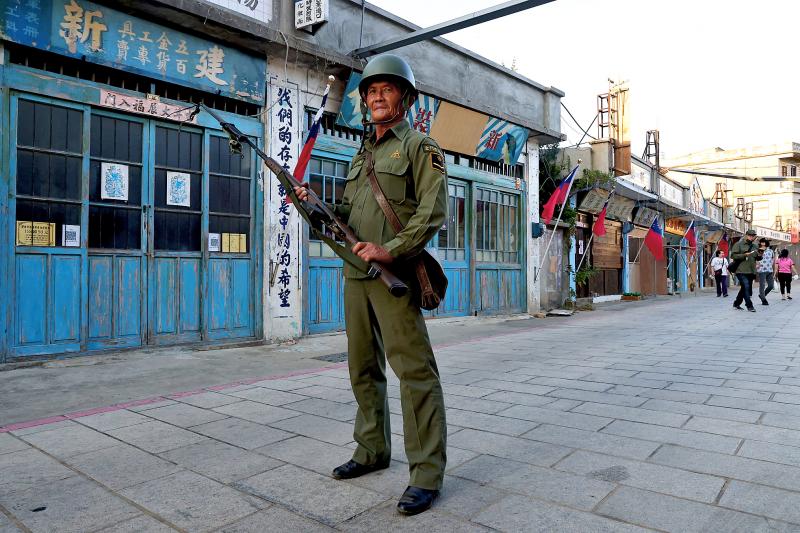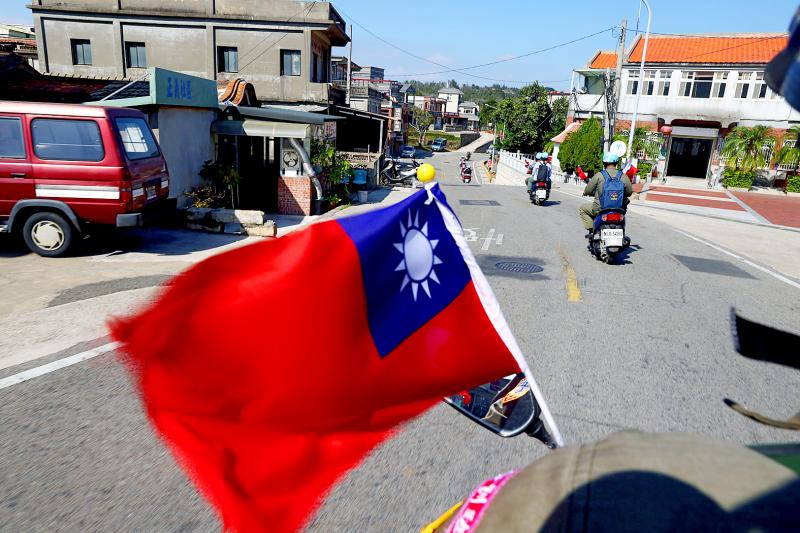Chen Ing-wen strides up to a rocky outcrop about 3km from China’s coast on Kinmen and demonstrates how, as a soldier, he used to shoot from there at Chinese trawlers that sailed too close.
“It was just to scare them — but they weren’t scared,” said Chen, 50, who performed his military service on Kinmen from 1991 to 1993. “We were not trying to kill them, just warn them away.”
Sitting on the front line between Taiwan and China, Kinmen is the last place where the two engaged in major fighting, in 1958 at the height of the Cold War, and where memories of war are burned into minds decades later — large model soldiers point guns at China from some old bunkers.

Photo: Ann Wang, Reuters
A recent spike in tensions, with China’s air force carrying out four days of mass incursions into Taiwan’s air defense identification zone starting on Oct. 1, caused alarm in Western capitals and Taipei that Beijing might be planning something more dramatic.
In Kinmen, less than an hour from Taipei by plane and directly facing the high rises of China’s Xiamen, there is no sense of panic nor restrictions on visiting from Taiwan, but only a feeling of surprise over questions about whether it is advisable to come.
“We are a very safe place. Whether economically or on people’s lives, we have not felt any impact from cross-strait tensions,” Kinmen County Tourism Department director Ting Chien-kang (丁健剛) said.

Photo: Ann Wang, Reuters
Kinmen, along with the Matsu archipelago further up the Chinese coast, has been part of Taiwan since the defeated Republic of China forces fled there in 1949.
Regular shelling did not end until Dec. 15, 1978, when Washington formally recognized Beijing over Taipei, although by then it was shells fired on odd-numbered days carrying propaganda leaflets that fell.
Still, those shells could and often did kill people, and terrified residents — a memory that haunts older Kinmeners.
“I don’t want that to happen again,” said Jessica Chen, 53, who runs a tea shop and remembers the shelling. “People may think the situation is tense, but we’re used to it.”
At its nearest point, from the Mashan (馬山) observation post, the main island of Kinmen is at low tide less than 2km from China. It was from there former World Bank chief economist Justin Lin (林毅夫) swam across to defect to China in 1979.
A much-reduced military garrison remains, way down from 100,000 at the height of fighting, with tanks on occasion rumbling through back roads and soldiers guarding hidden entrances to command posts dug under thick rock.
With new weapons, including precision missiles, any Chinese attack would likely bypass Kinmen and go straight to military targets on Taiwan proper, although Kinmen, which relies on China for a stable water supply, could easily be blockaded.
Kinmen’s government is working hard to promote the island as more than just a war monument, hoping to entice younger visitors to see its otters and go bird watching, to stay in trendy new boutique guest houses and enjoy the local oysters.
The time warp Kinmen exists in is everywhere to see, although much of that is intentionally kept for the tourists.
The old-fashioned language on carefully preserved propaganda signs calls Chinese communists “bandits,” and there are statues of Chiang Kai-shek (蔣介石).
Some have turned the past tensions into profit, such as Kinmen’s renowned makers of knives from old shell casings, even if they too do not want to go back to the old days of hiding in air raid shelters from Chinese attacks.
“Peaceful coexistence is much better,” said knife maker Lin You-hsin, 60.

Taipei has once again made it to the top 100 in Oxford Economics’ Global Cities Index 2025 report, moving up five places from last year to 60. The annual index, which was published last month, evaluated 1,000 of the most populated metropolises based on five indices — economics, human capital, quality of life, environment and governance. New York maintained its top spot this year, placing first in the economics index thanks to the strength of its vibrant financial industry and economic stability. Taipei ranked 263rd in economics, 44th in human capital, 15th in quality of life, 284th for environment and 75th in governance,

The Sports Administration yesterday demanded an apology from the national table tennis association for barring 17-year-old Yeh Yi-tian (葉伊恬) from competing in the upcoming World Table Tennis (WTT) United States Smash tournament in Las Vegas this July. The sports agency said in a statement that the Chinese Taipei Table Tennis Association (CTTTA) must explain to the public why it withdrew Yeh from the WTT tournament in Las Vegas. The sports agency said it contacted the association to express its disapproval of the decision-making process after receiving a complaint from Yeh’s coach, Chuang

Control Yuan Secretary-General Lee Chun-yi (李俊俋) tendered his resignation last night, admitting that he had misused a government vehicle, as reported by media. His resignation was immediately accepted by the Control Yuan. In a statement explaining why he had resigned, Lee apologized for using a Control Yuan vehicle to transport his dog to a pet grooming salon on May 20. The issue first came to light late last month, when TVBS News reported that Lee had instructed his driver to take the dog to the salon. The news channel broadcast photos that it said were taken by an unnamed whistle-blower, which purportedly showed the

A former officer in China’s People’s Liberation Army (PLA) who witnessed the aftermath of the 1989 Tiananmen Square massacre has warned that Taiwan could face a similar fate if China attempts to unify the country by force. Li Xiaoming (李曉明), who was deployed to Beijing as a junior officer during the crackdown, said Taiwanese people should study the massacre carefully, because it offers a glimpse of what Beijing is willing to do to suppress dissent. “What happened in Tiananmen Square could happen in Taiwan too,” Li told CNA in a May 22 interview, ahead of the massacre’s 36th anniversary. “If Taiwanese students or